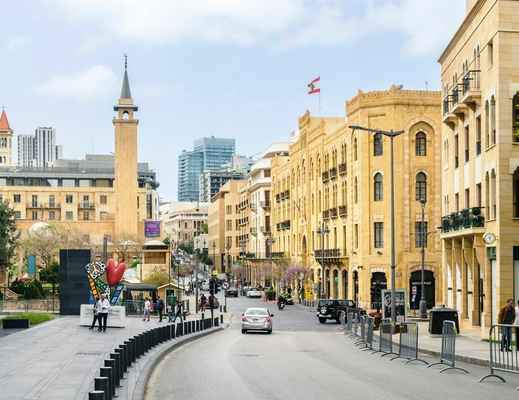


Beirut
Asia
/
Lebanon
/
Beirut
Often referred to as the "Paris of the Middle East," Beirut is a city where past meets the present. Perched on the rugged shores of the Mediterranean Sea in Lebanon, the city is blessed with a temperate climate — mild, rainy winters and hot, dry summers. Beirut's inherent vibrancy is thanks to its cultural richness, flavored by diverse civilizations that contributed to its historical narrative over centuries.
Beirut's local culture is an enticing mix of traditional and modern facets. Energized by its youthful demographic, the city boasts an ever-evolving arts scene that hosts contemporary art galleries and music festivals. Streets teem with the enticing aroma of Lebanese cuisine, renowned for its succulent meze, flavorful shawarma, and irresistible sweets like baklava. The city's culinary landscape also features global cuisines, reflecting its cosmopolitan nature and the rich diversity of its population.
Beirut is a city of resilience and spirit. Despite its historic trials, the city blossoms, offering visitors the opportunity to engage with its captivating charm and cultural wealth. Scenic views of the Mediterranean Sea beckon nature enthusiasts, while lovers of architecture will appreciate the mesmerizing harmony of Ottoman, French colonial, and modern designs. The National Museum of Beirut, with its impressive collection of ancient relics, and the buzzing Hamra district, known for its eclectic mix of cafes, bars, and shopping outlets, are must-visit spots in the city.
Strolling along the iconic Raouché Rocks, also known as Pigeon Rocks, is an experience not to be missed. The awe-striking natural formations set the stage for memorable coastal walks. Participating in a Lebanese cooking course lets travelers delve deeper into the region's culinary legacy, all while experiencing the hospitable nature of its people.

Travel Tips for Beirut
What you need to know before traveling here
Getting Around Beirut
A guide to Beirut's local transportation
Beirut lacks an underground metro system but features an urban railway network operated by Lebanon Railways. Primarily used for intercity travel, it connects various cities and suburbs with Beirut. Make sure to check the updated railway schedules and timings before your trip as the services can be sporadic.
Practical Tips for Beirut
Things to prepare and best way to visit
The official currency is the Lebanese Pound (LBP). However, US dollars are also widely accepted. It is recommended to carry a mix of both currencies, especially while shopping at smaller markets or shops.
The Beirut-Rafic Hariri International Airport is approximately 9 km away from the city center. Taxis and rideshare services are readily available, and many hotels offer shuttle services. It's best to check your transfer options in advance for a hassle-free arrival.
Beirut is generally a safe travel destination. However, staying informed about local news updates and travel warnings is necessary. Practice common sense in crowded areas and keep belongings secure.
Arabic is the official language, but English and French are also common, especially among the younger generation and in tourist hotspots.
While Beirut is significantly liberal compared to other Middle Eastern cities, displaying modesty in clothing is appreciated. Ensure appropriate dress, particularly when visiting religious establishments.
See All Practical Tips for Beirut

Explore Beirut
Create your itinerary with our top picks below

Travel Tips for Beirut

Explore Beirut



























 Facebook
Facebook Instagram
Instagram TikTok
TikTok Youtube
Youtube Telegram
Telegram
